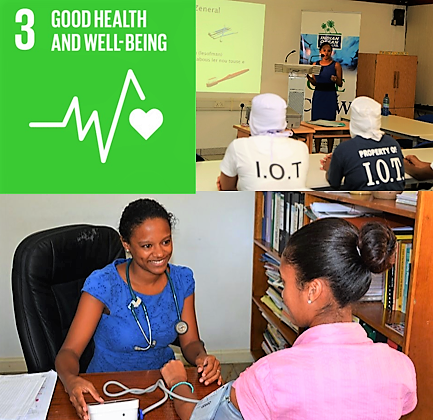|
SDG 3: GOOD HEALTH AND WELL-BEING The sustainable development goals (SDGs) are a new, universal set of goals, targets and indicators that UN member states will be expected to use to frame their agendas and political policies until 2030. Amongst the seventeen goals, goal number three is specifically related to health. Health, however, is also related to most of the remaining sixteen goals, such as reducing poverty (Goal one), improving education (Goal 4), and providing access to clean water and sanitation (Goal six). The third Sustainable Development Goal, aiming at improving Health and Well-being, consists of thirteen targets.
Seychelles has achieved some of the targets under SDG 3 before it was even launched. Maternal and child mortality were already low compared to many other countries with similar GDP. Our vaccination programmes work well and our reproductive health care services are available to everyone. Having health care services which are fully funded by the state have enabled us to stand out on a global scale, especially when it comes to Universal Health Coverage. Despite these achievements, our health system still faces challenges. Firstly, improvement is required in the quality and delivery of health services. Secondly, we need to find new solutions for retention of health care workers, and reduce the current high turnover of health care professionals. Thirdly, we need to tackle the increasing levels of non-communicable diseases such as diabetes and hypertension, and put more effort in combating the HIV and AIDS epidemic in the country. One of the ways we could improve health is to increase the amount of resources we put into prevention. The World Health Organisation’s definition for health indicates that health is not merely the “absence of disease”. Yet, in many cases, the burden of diseases in a country has been the main factor in determining the level of health in its community. The constant distress of health care systems across the world could be explained by the fact that wellness and prevention are systematically neglected. There is a tendency to spend most of the funds in reacting to emergencies, creating more of a sick-care system or disease management system, rather than a health care system. Even if it is important to help ill people to get their health back, it is remarkably more efficient to keep them healthy in the first place. Improving health status of the country requires effective cross-departmental action. Aside from the health care system, other determinants of health are education, food, housing, socio-economic status and the living environment. Effective communication across all governmental departments, leading to a broader context of government action on health will have a greater impact than improving the health care system alone. More efforts are required when it comes to recruitment, development, training and retention of the health workforce. The high turnover of health workers makes improving quality of the system challenging. We may even need to start questioning whether we are sacrificing quality by giving free healthcare, and whether having free healthcare is sustainable. Finally, the community needs to get involved in improving and promoting health, independently of the Ministry of Health. The sense of responsibility for one’s own health by adopting healthy practices can do wonders for the community. This type of promotion started off well in 2014 when the theme “My Health, My Responsibility” was first launched. Schools created activities under that theme without any contribution from the ministry. The power the community has in combating non-communicable diseases such as diabetes and hypertension, just by improving lifestyles, should not be underestimated. The health sector can enhance that by increasing the health literacy with innovative health education programmes, and other sectors can contribute by creating an environment to facilitate healthy choices. If we could all stop the blaming games regarding our health and start changing the things that are in our control, then I foresee nothing but the building of a happier and healthier Seychelles! Join the global conversation. Use the hashtags #sey4sdg , download the SDG Action app, visit globalgoals.org – help make the SDGs famous and tell the leaders of the world that this is what we want. You can also visit http://www.globalgoals.org/take-action/ and choose an NGO to get involved with: Global Citizen, Save The Children, UNICEF, UNDP – the choice is yours. Contributed by Dr Naomi Adeline 29/11/2023 13:30:02
The Importance of Hospitals for a Healthy Society
Reply
Leave a Reply. |
AuthorReza Moustache ArchivesCategories |

 RSS Feed
RSS Feed
21/3/2021
1 Comment